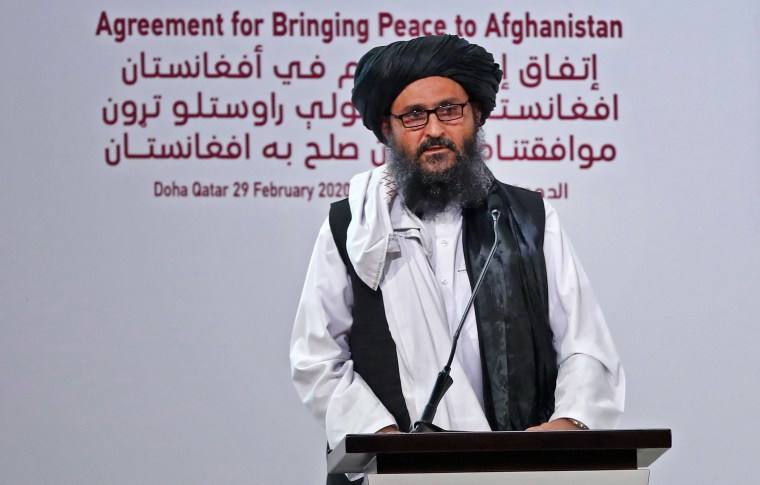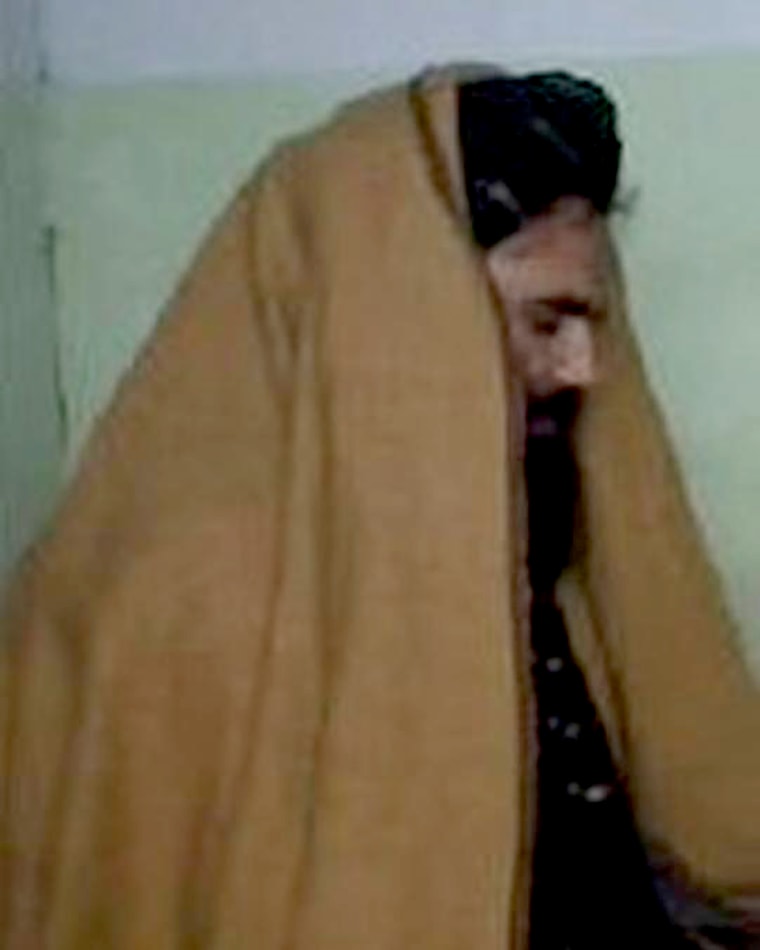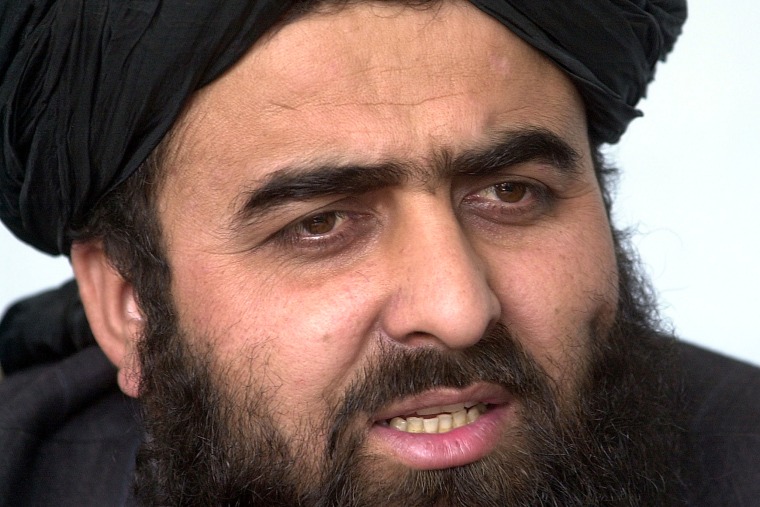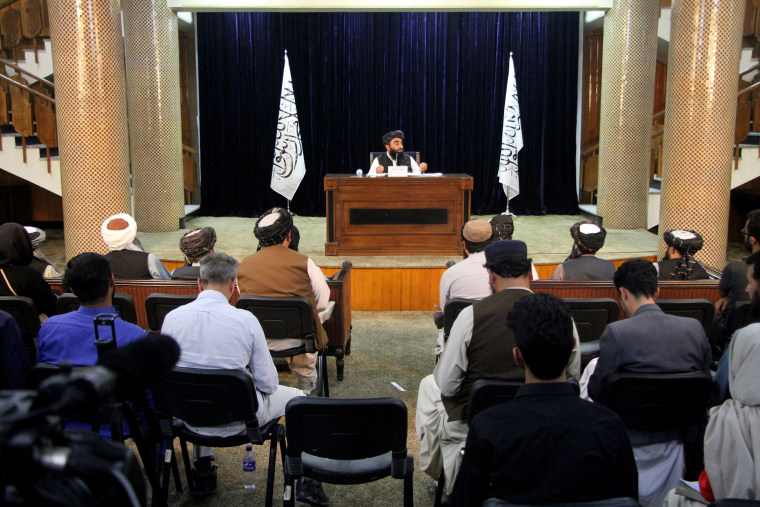After two decades in the wilderness, the Taliban told the world that they had changed and were ready to be inclusive — then they announced their new interim government.
All male, the caretaker Cabinet is made up entirely of long-standing hard-line members of the militant group, including a U.S.-designated terrorist.
A State Department spokesperson said it had noted the lack of inclusivity, but Kate Clark, co-director of the Afghanistan Analysts Network, a policy research organization based in Kabul,said it was not surprising.
"The Taliban never gave any hint that they wanted to include people other than themselves in the government," she said by telephone Wednesday.
"Anyone who thought they might make concessions or try to appease international opinion, or indeed, the opinions of other Afghans, to be honest, I think is a bit delusional," she added.
Who's in the interim government?
Mohammad Hasan Akhund, acting PM
Mohammad Hasan Akhund has long served as the head of the Taliban's Rehbari Shura, or leadership council.
Akhund, who was close to the Taliban's first leader, Mullah Mohammad Omar, before he died in 2013, was foreign minister and later deputy prime minister when the militant group ruled Afghanistan from 1996 to 2001.
After Al Qaeda terrorists flew planes into the World Trade Center in New York City, the Pentagon, outside Washington, D.C., and a field near Shanksville, Pennsylvania, the Taliban sheltered the architect of the 9/11 attacks, Osama bin Laden.
Akhund, who is on a United Nations blacklist, led the opposition to handing him over.
Abdul Ghani Baradar, acting deputy PM
Abdul Ghani Baradar was a founding member of the Taliban and the militant group's political leader.
Baradar, who was also close to Omar, served as defense minister when the group last ruled Afghanistan. He went on to become a senior military commander and helped to lead attacks on coalition forces, according to a U.N. sanctions notice.

Arrested in Pakistan in 2010 in a joint CIA-Pakistani operation targeting top Taliban leaders, Baradar was jailed for eight years before going on to head the Taliban's political office in Doha, Qatar, becoming a key figure in peace talks with the U.S.
Sirajuddin Haqqani, acting interior minister

Sirajuddin Haqqani was designated a terrorist by the U.S. government in March 2008 and a $10 million reward has been offered for information leading to his capture, according to the FBI.
The leader of the Haqqani network, which the U.S. has branded a terrorist organization, is wanted for questioning in connection with a January 2008 attack on a hotel in Kabul that killed six people, including one American, according to the FBI.
The Haqqani network, which officials have said operates like an organized crime family, has also been blamed for the kidnapping of several Americans as part of a kidnap-for-ransom business.
Haqqani is also believed to have coordinated and participated in cross-border attacks against U.S. and coalition forces in Afghanistan and is suspected of involvement in the planning of an assassination attempt on then-Afghan President Hamid Karzai in 2008.
Amir Khan Muttaqi, acting foreign minister
Amir Khan Muttaqi served as minister of culture and information and as minister of education when the Taliban were last in power.
He would later become part of the peace commission and negotiation team in Qatar that held talks with the U.S.

During the Taliban's insurgency, Muttaqi chaired the Invitation and Guidance Commission, which sought to encourage government officials and others to defect to the group.
During that time, he appeared to adopt a moderate tone while urging opposition in provincial capitals to talk to the group to avoid fighting in urban areas.
Mohammad Yaqoob, acting defense minister
Mohammad Yaqoob, the son of Omar, hoped to succeed his father as leader, but his plans were dashed in 2015 when the leadership council appointed Mullah Akhtar Mansour instead.
Yaqoob had stormed out of the council meeting, but eventually took on military roles within the Taliban. After he became head of the group's military commission last year, he oversaw operations in Afghanistan.
Alongside Baradar and Haqqani, he also served as one the group's deputy leaders.
Zabihullah Mujahid, acting deputy information minister
Zabihullah Mujahid has served as spokesman for the Taliban for a long time, providing information about the group's activities through his Twitter account and telephone calls with journalists.

Shrouded in mystery, not a single photo of Mujahid is known to exist and for years, U.S. military intelligence believed Mujahid was simply a made-up persona used by individuals running the Taliban's media operations behind the scenes, according to Reuters.
But he entered the limelight last month when he delivered his first news conference after the Taliban marched into Kabul unopposed without a shot fired.
How has the international community responded?
The Biden administration said Tuesday that it was still "assessing" the interim government.
A State Department spokesperson said it had taken note of the fact that the interim government was made up "of individuals who are members of the Taliban or their close associates and no women."
It was also "concerned by the affiliations and track records of some individuals," the spokesperson said, adding, "We have made clear our expectation that the Afghan people deserve an inclusive government."
German Foreign Minister Heiko Maas said Wednesday that his country wanted to "proceed together and in a coordinated manner" with the U.S.
Wang Wenbin, a spokesperson for China's Ministry of Foreign Affairs, said Wednesday that Beijing would "maintain communication with the new Afghan government."
China hoped that the new regime "will listen widely to the opinions of all ethnic groups and factions during the interim government, echoing the aspirations of its own people and the expectations of the international community," he said.
Download the NBC News app for breaking news and politics
Clark, of the Afghanistan Analysts Network, said she did not believe this was likely, because in the Taliban's eyes, they had "just achieved a tremendous victory."
"They defeated a superpower, they are in power, they have God on their side and they are filling all the posts with their own people," she said.
Without international aid, "the Taliban are going to face a really hard time," she said, adding that governing will be "extremely difficult" without that.
And the Afghan people would be the ones to suffer, she said.
"You've got a drought this year, you've had a pandemic and now suddenly you've got this freezing of aid," she said. "That's a huge crisis."
Chantal Da Silva reported from London and Mushtaq Yusufzai from Peshawar, Pakistan.
